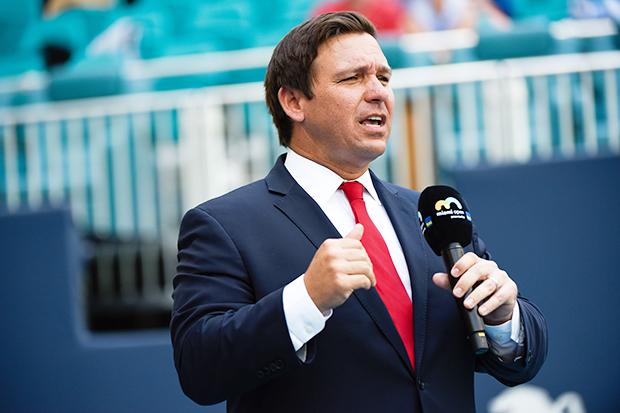
- Ron DeSantis is a former member of Congress and has been the Governor of Florida since 2019.
- DeSantis’ policies about LGBTQ+ rights, education, and DEI programs have faced much scrutiny.
- DeSantis filed paperwork to run for president on May 24, 2023.
Florida Governor Ron DeSantis has officially entered the Republican Primary for the 2024 Presidential Election. The Republican governor filed paperwork to officially declare his candidacy on Wednesday, May 24, per Politico. Ron released a video announcing his candidacy on Twitter, before having a conversation with Twitter CEO Elon Musk on the social media platform’s Spaces feature on Wednesday evening. “I’m running for president to lead our great American comeback,” he said in the clip.
DeSantis’ time on Twitter Spaces was widely mocked due to technical errors, but once it was up and running, he spoke with Musk and moderator David Sacks about his positions on different issues, including education, his battle with Disney, and more. After the Spaces discussion, he went live on Fox for his first TV interview since announcing his candidacy. During the interview, he touched on many of the same topics, but anchor Trey Gowdy did reference the Twitter debacle at the start. “Fox News will not crash during this interview,” he said.
DeSantis will face off against the other Republican nominees, including former President Donald Trump. DeSantis has served as the governor of the Sunshine State since January 2019. Prior to that, he represented Florida’s 6th district in the House of Representatives from 2013 to 2018. After his time as one of the members of Congress, he ran in the gubernatorial election and won. As the Governor of Florida, DeSantis has been responsible for some very controversial policies, and he’s faced much scrutiny ahead of his presidential campaign. As DeSantis formally steps into the ring, find out more about some of his most controversial stances over the years.

DeSantis’ Stance On Abortion: The 6-Week Ban
One of DeSantis’ most recent controversial moves as governor has been to enact a six-week abortion ban in Florida. He signed off on a six-week abortion ban on April 13, 2023, per The Associated Press. The governor signed into law the “Heartbeat Protection Act,” which “prohibits abortions once the unborn child has a detectible heartbeat,” per a press release. “I applaud the Legislature for passing the Heartbeat Protection Act that expands pro-life protections and provides additional resources for young mothers and families,” he said in a statement. The bill does contain exceptions, when it comes to protecting the life of the mother or in cases of rape and incest up to 15 weeks.
The six week ban was signed almost exactly one year after DeSantis signed the “Reducing Fetal and Infant Mortality Act,” which banned abortion after 15 weeks. The new laws have been very controversial, especially after the Supreme Court overturned Roe V. Wade in June 2022.
Examining The Implications Of A 6 Week Ban
Florida is now one of 13 states, which have enacted a six week abortion ban, including Georgia, Texas, Idaho, Iowa, Kentucky, Louisiana, Mississippi, North Dakota, Ohio, Oklahoma, South Carolina, and Tennessee, per Pro-Choice America. Besides making abortions illegal after six weeks, Florida’s new bill also makes it a second degree felony for doctors in Florida to perform abortions. It also stops state funds from going to businesses or education institutions, which will support employees or students from traveling out of state to have abortions performed, per Planned Parenthood Action.
As many states have enacted six-week abortion bans since Roe V. Wade was overturned, many critics have come forward to criticize the new laws. Many of the criticisms come from the fact that at six weeks many people don’t even realize that they’re pregnant. This forces many people to travel out of state to places where abortion is legal to receive necessary healthcare, via Planned Parenthood.
DeSantis & Education: The Controversial School Books Ban
Across the nation, there have been so many books that have been banned by Republicans, citing “controversial” content. DeSantis and the Republican-majority legislature have passed laws to stop classrooms from using books that include discussions of race, gender, and sexual orientation, including examples like Toni Morrison’s Beloved and Margaret Atwood’s The Handmaid’s Tale, per The New York Times. He’s also railed against “critical race theory” from being taught in the classroom, according to WPTV.

DeSantis has fought back against claims that he has aimed to ban books as a “hoax” in a press release. “Exposing the ‘book ban’ hoax is important because it reveals that some are attempting to use our schools for indoctrination,” he said in a statement. “In Florida, pornographic and inappropriate materials that have been snuck into our classrooms and libraries to sexualize our students violate our state education standards. Florida is the education state and that means providing students with a quality education free from sexualization and harmful materials that are not age appropriate.”
In addition to banning books, DeSantis has also enacted the Florida Parental Rights In Education Act, which has also become known as the “Don’t Say Gay” bill. The law restricted school teachers from giving lessons involving sexual orientation or gender identity for children from kindergarten to third grade, per NPR. The bill was expanded to all grades in March 2023, via The Associated Press.
After the bill was expanded the LGBTQ+ advocacy group GLAAD released a statement calling out the decision. “This move unfortunately further cements Florida’s growing reputation as a state led by extremists obsessed with censorship, book bans and other targeting of LGBTQ people. ‘Don’t Say LGBTQ’ has already had a disastrous chilling effect on Florida classrooms, now Florida wants to expand and encourage that silencing and harassment to all grade,” GLAAD President and SEO Sarah Kate Ellis said in a statement.
Understanding the Florida Parental Rights In Education Act
Besides prohibition on content taught in the classroom, the bill also requires parents to notify ” parents if there is a change in services from the school regarding a child’s mental, emotional or physical health or well-being,” according to a press release. Many LGBTQ organizations have filed lawsuits against DeSantis to try to block the law, saying that it’s a means to censor members of the LGBTQ community from speaking on topics related to their community, per NPR. There have also been laws passed prohibiting educators from asking students about their preferred pronouns.
Transgender Rights Under DeSantis: A Look At The Policies
As many states legislate about the rights of transgender people and youths, Florida is no exception and DeSantis signed four bills into law that target the LGBTQ community on May 17, 2023. One of the bills SB254 bans transgender minors from receiving gender-affirming care, including puberty blockers, surgeries, and hormone replacement therapy. Another bill also requires transgender people to use the bathroom corresponding to the sex they were assigned at birth, per BBC.
Impact on Transgender Youth: Affirming Care & Identity Issues
Despite many laws preventing transgender teens from receiving the gender-affirming care that they need, many medical organizations have spoken out against laws trying to prevent transgender youth from receiving the care that they need. The American Medical Association has issued a statement calling for legislators to stop interfering with what should be kept between doctors and patients. “Decisions about medical care belong within the sanctity of the patient-physician relationship,” they said. “We believe it is inappropriate and harmful for any state to legislatively dictate that certain transition-related services are never appropriate and limit the range of options physicians and families may consider when making decisions for pediatric patients.”
While many medical professionals support transgender youth receiving affirming care, current guidelines don’t recommend transgender teens receiving affirming genital surgery until they are 18, according to The Washington Post.
In light of multiple anti-LGBTQ bills being passed by the state legislature and many being signed by DeSantis, the Human Rights Campaign, Equality Florida, and many other advocacy groups have issued travel advisories for Florida. HRC President Kelley Robinson issued a statement warning members of the community about DeSantis’ policies. “Because of Ron DeSantis and his frenzied appeal to extremists, LGBTQ+ people in Florida are finding themselves in a state of emergency every single day. Since the day he took office, Governor DeSantis has weaponized his position to weave bigotry, hate, and discrimination into public law for his own political gain,” she said. “Those who visit must join us in their vocal opposition to these dangerous policies. Those who pick another place to work, to go to school or to spend their vacation should make clear why they’re not heading to Florida. And to all of our friends and family in Florida, we stand with you and with Equality Florida — we’ll keep working hard to make Florida feel more like the home you deserve it to be.”
The HRC’s advisory came shortly after the NAACP similarly gave a travel warning about Florida. “Florida is openly hostile toward African Americans, people of color and LGBTQ+ individuals. Before traveling to Florida, please understand that the state of Florida devalues and marginalizes the contributions of, and the challenges faced by African Americans and other communities of color,” the statement said.

DeSantis’ Position On Gender, Equity, & Inclusion Programs
Florida Gov. Ron DeSantis signed a bill blocking funding from the state and federal government from being used for diversity, equity, and inclusion programs at public colleges on May 15, 2023, according to The Associated Press. A press release announcing the signing claimed that such programs are “discriminatory,” and that the bill preventing such programs would be empowering to the schools. “By signing this legislation we are ensuring that Florida’s institutions encourage diversity of thought, civil discourse, and the pursuit of truth for generations to come,” DeSantis said in a statement. The governor has claimed that such programs were attempts to “indoctrinate” students into “woke ideology.”
Implications For Public Schools & Colleges
Besides taking away public funding for such programs at public universities, many critics have called out DeSantis for the ban on DEI programs as political. Provost and Executive Vice President of the University of Montana Pardis Mahdavi spoke out about what schools would lose in an op-ed for the Los Angeles Times. Mahdavi explained that funding for such programs is often used to coordinate events such as guest speakers or celebrations of different cultures. “Administrators will now question whether they can continue to financially support events of this type because it is unclear if they might fall under prohibited diversity initiatives,” she wrote. “Schools without diversity programs put students at a disadvantage. If one of the goals of higher education is to prepare students to enter and develop the workforce — a goal lauded by politicians on both sides of the aisle — colleges must teach them the skills to engage with diversity work.”
Gun Control In DeSantis’ Florida: A Move Toward Looser Laws?
At a time when many Americans are calling for stricter gun safety laws and regulations, DeSantis joined many states in signing a bill allowing Floridians to carry concealed guns without a permit back in April, when he signed HB 543. Still some gun rights activists have called for even looser laws allowing open carry, per Politico.
Specifics Of DeSantis’ Gun Laws & Their Impact
While HB 543 doesn’t stop the state’s Department of Agriculture and Consumer Services from issuing licenses for concealed carry, the bill ended the requirement for gun owners to have the permit for concealed carry, according to the Department. The bill comes at a time when so many Americans are galvanized for stricter gun safety laws. There have been over 200 mass shootings in the United States in 2023 as of May 8, according to ABC News. States with lax laws concerning concealed carry permits reportedly have higher crime, including mass shootings, violent crime, firearm robberies, and more, according to the Center for American Progress.
DeSantis & Entertainment: The Ban On Drag Shows
Another bill that has been criticized as Anti-LGBTQ by opponents signed by DeSantis was SB1438, which blocks children from being able to attend drag shows. The law prevents adults from bringing children to “adult performances” and could revoke food or liquor licenses from venues that allow children to attend drag performances. In a statement, the Florida governor said that the state was “standing up for our children.”
The bill had been dubbed the “Anti-Drag Show” bill by the American Civil Liberties Union. The Florida ACLU pointed out that the law contained “vague language that can be used to attack drag shows and performances even though Florida law already prohibits exposing minors to shows considered sexually explicit or harmful.”
Voting In DeSantis’ Florida: Tougher Laws For Registration & Voting
Following the 2020 election, Trump falsely claimed that he lost the election due to widespread fraud. While his claims have been rebuked and disproven, many different politicians have enacted laws surrounding voters. In 2021, DeSantis passed SB90 to “safeguard the sanctity of Florida Elections.” The bill included terms about “strengthening voter identification, prohibiting the mass mailing of ballots, banning ballot harvesting and prohibiting private money from administering elections,” per a press release. In April 2022, he passed another bill relating to elections, which required voter rolls to be updated annually, increased penalties for voting fraud, and set up the “the Office of Election Crimes and Security to investigate election law violations.” Some of the laws also allow citizens who are not able to vote due to past convictions to be charged.
The Potential Impact For Voter Turnout In Florida
Many of DeSantis’ voting laws have been criticized as confusing and said that they unfairly target voters. Following the 2020 election, 20 voters, many of whom were Black and had been convicted of felonies in the past, were arrested on voter fraud charges, per the Tallahassee Democrat. The voters who had been arrested had incorrectly been told that they could vote by election officials. A number of Florida organizations, including the NAACP, ACLU, and Brennan Center released a joint statement calling out the law for a lack of clarity. “The DeSantis Administration and the state legislature made it nearly impossible for people with past convictions to determine their eligibility to vote and the state continues to refuse to provide any meaningful guidance to ensure that these Floridians can find out whether they’re eligible to vote,” they said.
Additionally, Florida also saw a drop in voter turnout for the 2022 midterm elections compared to the 2018 midterms, according to Palm Beach Daily News. Many of the voters who had previously been convicted did not cast ballots in the most recent midterms, out of fear of being charged


